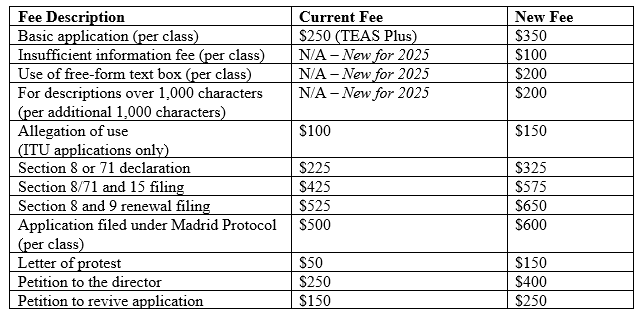The United States Patent and Trademark Office (USPTO) recently announced a new fee structure for trademark filings, effective January 18, 2025. While any fee increase from the government creates incentive for grumbling, this new fee structure will likely have profound impacts not only on the ultimate fees to pursue registration but also on fundamental strategies used in drafting and filing trademark applications.
The table below summarizes the proposed fee increases for common trademark filings.

The TEAS vs. TEAS Plus Distinction Is Gone
Importantly, with the fee changes in 2025, the USPTO is revising a prior feature of the filing system. Specifically, the USPTO previously had tried to encourage filers to use standard identifications of goods and services by offering a discount on “TEAS Plus” filings if the filers properly chose form identifications from the USPTO’s online manual of identification (ID Manual).
With this fee structure, the TEAS Plus Application is going through a rebranding, now referring to the filing as a Basic Application, with an associated fee increase of $100 to $350 (which had been the filing fee for a TEAS Application). Applicants may still file an application without using the ID Manual; however, as further described below, such an application could incur hundreds or even thousands of dollars of surcharges, rather than the $100 flat differential applicants currently pay.
Impacts on Madrid Filers: Applications filed via the Madrid Protocol are not subject to the requirements of a Basic Application, as International Applications come with a slight increase in the current pricing as of January 18, 2025.
List of Surcharges
- Insufficient information fee ($100): This new line item creates an additional $100 fee per class for any application filed that has missing or incomplete information in any of 19 categories (e.g., applicant’s name and domicile address, legal entity and citizenship, a description of the mark).
- Use of free-form text box for the identification of goods/services ($200): The Basic Application presumes that applicants will use the ID Manual to describe the applied for goods and services. However, if the ID Manual does not list an appropriate entry, then the applicant may instead use the free-form text box. However, for each class in the application that uses the free-form text box, the fee increases from $350 per class to $550 per class. It also appears that this is an “all or nothing” selection, meaning you cannot select the ID Manual for one class and free-form text box for another.
- 1,000+ character surcharge ($200): Additionally, applications that use the free-form text box and that have a description over 1,000 characters will incur an additional $200 per class for every additional 1,000 characters included in the description. It is noted that the character limit surcharge only applies at the initial filing stage. Applicants are not penalized for going over the 1,000-character threshold if they do so because the examiner has requested additional clarification and specificity.
Strategic Choices and Best Practices Impacted by New Fees
Don’t wait! File applications and maintenance filings now! If you are considering filing trademarks in the near future, or if you have maintenance filings that could be filed now, you would be well-served to file before January 17, 2025, to avoid the increased fees and possible surcharges.
Gather all necessary filing data and check that it’s accurate before you submit. The new system charges fees for failing to identify the proper domicile address; not including descriptions of any graphic elements in the mark; and failing to provide citizenship or other basic information. These details, some of which can be difficult to pin down if applicants are in a hurry, previously could be cleaned up during prosecution without charge. Now that the office has the ability charge for clean-up, further thought should be given to gathering the details before submitting the application.
Rethink drafting the identifications to avoid surcharges. The new fees and structure will impact the drafting of identifications in two important ways.
- To balance cost with coverage, most applicants will need to reconsider whether the standard identifications are adequate to the chore of gaining coverage for their marks. While the ID Manual can be limiting, it also offers (at least to some filers) simplicity and adequate coverage for the price of the Basic Application. Think of it as buying basic insurance coverage without footing the bill for all the riders. If the applicant wants the very best coverage, the application is likely going to cost more than the Basic Application filing fee. If budget is paramount, go with the Basic Application.
- If the applicant is considering going outside the ID Manual, the 1,000-character limit will also create challenges. For example, an identification that covers educational services. often requires the applicant to identify a field or topic covered by the services. However, those who provide educational services (e.g., institutions of higher education) might offer a wide variety of educational services covering a wide variety of topics. Listing all the educational services that an institution provides together with all the topics or fields covered by those services could easily trigger the 1,000+ character surcharge.
To avoid these fee increases, the respective filing must take place. Any filing submitted after this date will be subject to the new fee structure and pricing.
If you have any questions regarding the content of this alert, please contact Deb Peckham, partner, at dpeckham@barclaydamon.com; Sara Dorchak, counsel, at sdorchak@barclaydamon.com; Kat Delos Reyes, associate, at kdelos@barclaydamon.com; or another member of the firm’s Trademarks, Copyrights & Licensing Practice Area.